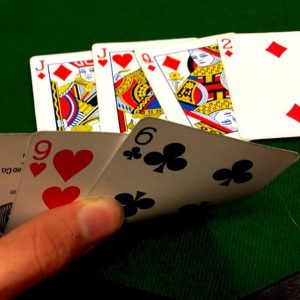Basic Tips for Improving Your Seven Card Stud Play

If you want to be a great mixed game player, then you need to work on your Stud poker game. Seven Card Stud and its variants consist anywhere from 30 to 60 percent of the games in many mixed poker games. Today we will talk about Stud Hi and review some common principles of basic Seven Card Stud play.
Pay Attention to Door Cards
Seven Card Stud offers more information about player hands than any other form of poker. If hands go to showdown, you will see 57 percent of opponents hands. In addition, you will also see the cards from other players that have folded prior to showdown.
As such, you need to pay close attention to cards that have already been shown. This will help you put your opponent on a hand as a hand progresses. Also, it will also help you keep track of your outs. This is important if you’re opponent appears to be drawing to a straight or flush. Tracking outs will help you know if they likely got there or if they are bluffing.
Beware a Paired Door Card
If you watch Stud being played, you will commonly see players fold on fourth street when someone pairs their door cards. The reason behind this is that many Stud players will start with a pair, and the door card often represents their pair. For example, if the door card is a jack, they likely have split jacks.
When they catch an open pair with their door card, many times they have trips. Even if they don’t have trips, they have just caught two pair. Unless you have a big hand or feel comfortable chasing down a big draw, it is time to fold.
Fifth Street is the Decision Street
Many Stud hands that don’t go to showdown will stop at fifth street. The reason behind this is that fifth is when the bets double. Also, it is usually incorrect to fold after fifth street in a hand unless you are drawing and missed or you are absolutely sure you are beat.
If someone starts with a three card straight or flush draw, they typically will take one off on fourth if they miss and then let go of a hand on fifth if they brick again. The same is true of a hand with a small pair that fails to improve, or a big pair where the opponent shows significant improvement by fifth. Just remember, improve by fifth or get out.
Be Careful of the Blind River Check
You will notice that in many hands, a player in the lead on sixth street will make a blind check going to seventh. For many players, the reason behind this check is simple. First, they may be on a draw and don’t want to commit another bet unless they hit. Often, you will see the player check before squeezing their river card.
Next, they might have a hand that is vulnerable to being outdrawn on, such as two pair against a potential draw. If someone checks dark to you, in many cases you will be wise to check behind unless you have a big hand or you have strong reason to believe that you either have their hand beat or can force a fold.
Work on Improving Your Stud Game
If you hope to be competitive in mixed games, playing Stud competently will put you far ahead of the average curve. Live players will have a hard time finding regular Stud games, but online players can often find games on the larger poker sites such as PokerStars.
If you are not well versed in Stud games there are two books you should check out. Roy Cook‘s book “7 Card Stud 42 Lessons” and Ashley Adams‘ book “Winning 7-Card Stud” are both great books for beginning players. Keep in mind that Stud is not the same as Hold’em and older theory and strategy still applies to many games, especially at lower limits and many middle limit games.
